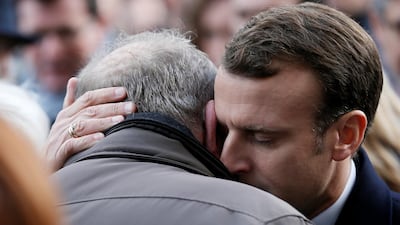The widow of an ISIS attacker who stormed the Bataclan concert venue in Paris has been repatriated to France and charged with associating with terrorists, sources close to the case said on Wednesday.
The woman, identified as Kahina El H, was among a group of 51 women and children brought back from detention camps in north-east Syria, where they have been held since the fall of the ISIS.
Details of the repatriation came as the European Court of Human Rights (ECHR) condemned France for refusing to allow two female citizens being held in Syria ― who had travelled with their partners to join ISIS ― to return home.
France should quickly re-examine a request from the women's parents to let them return home, the court said, saying there had not been sufficient reviews to ensure against “arbitrariness” of the refusal.
ISIS-linked repatriations are controversial in France, which has largely refused to bring home citizens accused of joining groups in Syria or Iraq, and the Bataclan case is sure to focus attention.
Court filings show Kahina El H married Samy Amimour, who killed dozens of people at the Bataclan during an ISIS attack on Paris, soon after she arrived in Syria in October 2014.
A few weeks later, she allegedly sent a video to Amimour's sister in which she threatened “to return to France to slit the infidels' throats”, and later appeared in a photo carrying a machinegun.
Three days after the November 13, 2015, attack, Kahina El H sent an email to a friend identifying Amimour as her husband and praising his actions.
Also among the women returned in July was Emilie Konig, a notorious French female extremist who is on the UN's black list of the most dangerous terrorists.
The ECHR ruling on Wednesday said France's refusal to repatriate the women and children was a breach of the rights of an individual to “enter the territory of the state of which [one] is a national”.
The two women are detained in Kurdish-run camps in north-east Syria and have given birth to children while living in the Middle East.
Their parents took their legal fight to the European court in Strasbourg after French authorities repeatedly refused to allow their daughters and grandchildren back into the country.
The families had argued their prolonged detention in Syria exposed the women and children to inhumane and degrading treatment, and denied their right to respect for family life.
The French government has long refused such a move, saying Islamist fighters and their families must face local justice.
Nicolas Hervieu, a legal expert at the Paris Institute of Political Studies, said the ECHR ruling did not grant a general right to repatriation because “France is not responsible for their life and physical integrity in and of itself”.
In reaction to the ruling, government spokesperson Olivier Veran said France had “not waited for the European court decision” to move forward, pointing to the repatriation in July of 16 women and 35 children, some of them orphans, in chartered planes.
That move broke with France's case-by-case policy of bringing children back to France without their mothers.
Rights groups say about 75 French women and 160 children are still in the camps. They are among more than 40,000 foreign citizens in detention, most of them Iraqis, according to Human Rights Watch.












